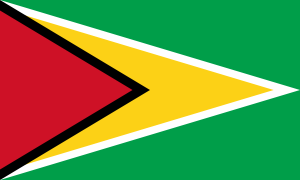Guyanese people
|
| |
| Total population | |
|---|---|
| Up to 799,613 | |
| Regions with significant populations | |
|
| |
| Languages | |
| English (including Guyanese Creole, American English, British English and Canadian English), Akawaio, Caribbean Hindustani, Macushi, Wai-Wai, Arawakan, Cariban | |
| Religion | |
| Hinduism, Pentecostalism, Roman Catholic, Islam, Anglicanism |
Guyanese people are people originating from Guyana, officially named the Co-operative Republic of Guyana, which is located on the northern coast of South America and borders the Caribbean Sea. While geographically Guyana is a part of the South American mainland, it is culturally much more similar to the nearby island nations of the West Indies such as Trinidad and Tobago, Barbados, Saint Vincent and the Grenadines and Grenada. In fact, Guyana is considered a Caribbean country even though it is not an island nation located in the Caribbean Sea, as are most Caribbean nations.
Guyana is also a founding member of the Caribbean Community CARICOM. However, Guyana does share some of the Latin American customs and traits that are characteristic of its South American neighbors, and it is also a founding member of the Union of South American Nations which formed in 2008. In addition to some Latin American and a great deal of Caribbean influence, Guyana's culture also reflects its European history as it was originally a Dutch, then British colony. Guyana (known as British Guiana under British colonial rule) only gained its independence from the United Kingdom in 1966 and subsequently became a republic in 1970. Because of Guyana's long, 170-year history as a British colony, today it is a part of the Anglophone Caribbean - a subregion of the Caribbean consisting of independent, English-speaking nations that were once British colonies (also known as the Commonwealth Caribbean). While Guyana is the only country in South America with English as the official language, the majority of people in Guyana actually speak Guyanese Creole which is a creole language that is largely based on English and contains some minor influences from the Arawakan, Dutch and Caribbean languages.
Demographics
Guyana is a diverse nation, 43.5% of the population is of East Indian origin, 31.2% Black African (see Afro-Guyanese), 16.7% multiracial (almost all part African), 9.2% Amerindian and 0.46% other, mostly Chinese and whites (most notably Dutch people, Portuguese and English). English (in the form of Guyanese Creole) is the most common language amongst Guyanese people in Guyana and its diaspora, while British English is taught in School, and used in Government and business. The religious breakdown of Guyanese people is: Hindu 28.4%, Pentecostal 16.9%, Roman Catholic 8.1%, Muslim 7.2%, Anglican 6.9%, Seventh-day Adventist 5%, other Christian denominations 20.5%, no religion 4.3%, Rastafarian 0.5%, Bahá'í 0.1%, other faiths 2.2%.[1]
Diaspora
Overseas Guyanese communities mainly exist in the United States (86,120 Guyanese born), United Kingdom (20,872 Guyanese born), Canada (14,560 Guyanese born), and the Netherlands (328 Guyanese born), although the total populations (i.e. people of Guyanese descent born in that country) are much higher.
The reason for this mass exodus were the highly oppressive policies of Forbes Burnham, former president and dictator who was widely regarded as a rigger of elections.[2]
The migration of Guyanese to other countries began in the late 1950s when some Guyanese (mainly young men, and some women) took up offers from the British Government to migrate to England to supplement the British labour force, like other Caribbean countries. This was a short lived policy as the British government quickly closed the doors on open immigration from its Caribbean Territories. The migration of many Guyanese Portuguese to the U.K and Canada happened in the late 1960s and early 1970s due to political struggles and problems at the time.
The migration of Guyanese to other Western countries, mostly Canada and the United States, continued throughout the 1970s and 1980s, much of it due to political and economic problems. The Forbes Burnham government continuously doctored elections through the 1970s in his favour, and was feared by many for his Stalinist behavior. The 1980s saw mass migration due to continuing misguided economic policies and problems, continuous shortages of basic items on a daily basis, and a country run much the way Cuba is perceived today. While many left due to political, economic, and social problems, those who could afford it left looking for better opportunities and some for educational purposes. The 1990s saw migration to other Caribbean countries. Migration continued by the need to reconnect split families. The migration of Guyanese to other lands continues today.
See also
- Demographics of Guyana
- Indo-Guyanese
- Afro-Guyanese
- Guyanese American
- Guyanese British
- Guyanese Canadians
References
- ↑ "The World Factbook". Cia.gov. Retrieved 2015-12-13.
- ↑ Archived April 25, 2007, at the Wayback Machine.
